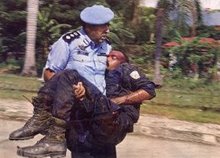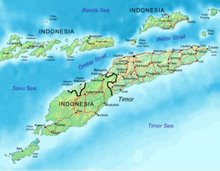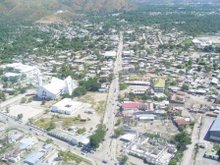Australian Broadcasting Corporation
TV PROGRAM TRANSCRIPT
Broadcast: 05/06/2006
Dili streets remain unstable
Reporter: Scott Bevan
KERRY O'BRIEN: It's now 11 days since the first wave of Australian troops arrived in Dili. But its streets remain unstable. Gangs continue to cause mayhem, and the Australian commander Brigadier Mick Slater, has admitted that controlling the gangs is more a policing job than a military one, adding his voice to the growing chorus for more police to be sent to restore law and order. Watching all this from the mountains is rebel East Timorese major, Alfredo Reinado. While he is geographically distant from the violence in the capital and is being supervised by elite Australian SAS Soldiers, Major Reinado is seen as a key figure in the efforts to bring an end to the crisis. Scott Bevan travelled into the mountains beyond Dili to meet with Major Alfredo Reinado.
MAJOR ALFREDO REINALDO, REBEL MILITARY LEADER: All I'm doing is defending the right of the people and defending my country - defending the stability of my country.
SCOTT BEVAN: Perched near the roof of East Timor where the mountains pierce the clouds, the village of Mabisi looks like a serene place. Lately, political and military leaders have been focusing on this location, seeking peace not from the landscape, but from the man who has taken up residence in this old Portuguese hill-top home, Major Alfredo Reinado. He's seen as the leader of the 600 soldiers who broke away from the main ranks of the East Timorese army in March, claiming discrimination, and in the process, exposed the destructive cracks that have now splintered the very heart of this young nation. Major Reinado left Dili in disgust and headed for the hills after security forces opened fire on protesters supporting the rebel soldiers on April 28. This term "rebel leader" , what do you think about that?
MAJOR ALFREDO REINADO: I'm not a rebel leader, I still love my institution. I am here because I love my institution, I defend my institution. I don't agree with what's been done in 28 April. I'm not with them and I will not any political party to accuse my institution. This institution belong to this country, belong to the people. That's why I rejected them, I'm not with them.
SCOTT BEVAN: Major Reinado has faith in the international forces in his country to help restore stability. And among the visitors to his hill-top compound has been the Australian Commander Brigadier Mick Slater. He won't reveal what the brigadier said or if the Australian issued any orders.
MAJOR ALFREDO REINADO: I'm not taking orders from him, but I'm taking orders from my President. Whatever is agreeing with my President. Whatever my President orders me to do, I will do it, as long as he can explain it, to give a guarantee for the nation to be stable.
SCOTT BEVAN: Your President has given you no orders?
MAJOR ALFREDO REINADO: No, about that, no.
SCOTT BEVAN: Has he talked to you?
MAJOR ALFREDO REINADO: Always.
SCOTT BEVAN: Many of the local representatives of law and order are still in the hills, including the police chief, Paulo Martins.
CHIEF SUPT PAULO MARTINS, NATIONAL POLICE CHIEF: You know the situation now in Dili is very bad. Civilian people take arms. It's very dangerous, and now my people cannot go to the city because if we entered through the city we have to go without the weapon. So we have to stay in the mountain.
SCOTT BEVAN: Chief Supt Martins is still angry about the 25 May attack on his men by East Timorese soldiers. It's believed nine police officers were killed. And will you be able to work with the armed forces again?
MAJOR ALFREDO REINADO: I think so, we have to work together with them.
SCOTT BEVAN: The looting, fighting and torching of buildings have continued as gangs make the most of the instability.
SUKEHIRO HASEGAWA, UN SPECIAL REPRESENTATIVE: They found out that there is nobody who can stop them from doing it.
SCOTT BEVAN: What about the Australian troops? Why can't they stop them doing it?
SUKEHIRO HASEGAWA: Yes, I think Australian troops are doing their best. I believe that what we need now is in addition to the troops, we need international police force to ensure that the law and order be maintained.
SCOTT BEVAN: The head of the United Nations Mission in East Timor, Sukehiro Hasegawa, says four years ago there were close to 1,000 UN police officers here. Now there are about 25. He hopes Australia can provide more police officers. At the moment, there are 107 Australian Federal Police in Dili.
ALEXANDER DOWNER, AUSTRALIAN FOREIGN MINISTER: See you later.
SCOTT BEVAN: On Saturday, Sukehiro Hasegawa met with Australia's Foreign Minister Alexander Downer and AFP commissioner Mick Keelty in Dili.
ALEXANDER DOWNER: The UN presence is probably a little small and a little inadequate. Of course, the really important component of the UN's presence in the short-term I believe should be a police presence. I think the UN can do more to assist in areas such as reconciliation and governance, as well.
SCOTT BEVAN: Sukehiro Hasegawa concedes after East Timor gained its independence in 2002, the UN could have done more to help the infant nation .
SUKEHIRO HASEGAWA:I think the United Nations suddenly has to recognise that we could have perhaps stayed longer. We could have insisted that the region have maintained a robust presence.
SCOTT BEVAN: The UN's mandate in East Timor officially ends on the 20th of this month, but that's expected to be extended until at least next year.
SUKEHIRO HASEGAWA: We should have stayed here firmly through the period of elections and to make sure that we can help them to conduct free, fair and credible elections.
SCOTT BEVAN: East Timor's leaders point out that the upheavals have been mainly restricted to Dili and there's hope that President Xanana Gusmao's call for national unity will be heeded across the land so that the fractures and divisions that have cleaved apart the capital, won't be repeated throughout the country.
MAJOR ALFREDO REINADO: If we didn't take any steps to solve it, it is better to do what they're going to do now, minimise things, step-by-step, getting to the negotiation. Only negotiating can end it, because violence and weapon never ended any action that can give a guarantee.







1 comentário:
find thishere see hereVisit This Link check over hereyou can try here
Enviar um comentário